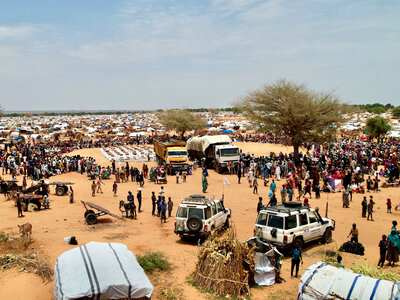Emergency
Sahel
- 10 million
- people suffer acute hunger
- 3.5 million
- people in Burkina Faso, Mali and Nigeria are trapped in besieged areas
- US$620 million
- needed for WFP operations up to August 2025
The conflict in the Sahel is upending lives and livelihoods and forcing more people to flee in desperation. The climate crisis, conflict, inter-communal tensions, declining agricultural production and global economic downturns that increase food and fuel prices are the major drivers of hunger in Central Sahel – including Burkina Faso, Chad, Mali and Niger.
Escalating violence in Burkina Faso, Mali and Niger has driven hundreds of thousands of refugees across the border, seeking safety in coastal countries. This makes West Africa one of the fastest-growing displacement crises in the world.
An estimated 3.5 million people In Burkina Faso, Mali and Nigeria remain trapped in besieged areas and are cut off from assistance. Access to besieged areas is one of the greatest challenges humanitarian workers face.
Ongoing insecurity in Niger, along with low agricultural productivity, climate shocks and volatile markets, is driving up hunger and humanitarian needs – which had already hit unprecedented levels in recent years.
All forcibly displaced people in Central Sahel need urgent, life-saving assistance. Most of them are hosted by communities who are themselves often deprived and extremely vulnerable. Food needs are inexorably on the rise, at a time when humanitarian access is becoming increasingly challenging.
The World Food Programme (WFP) couples life-saving humanitarian response with an integrated package of activities that shore up livelihoods, restore ecosystems, create jobs and build social cohesion.
However, WFP will be forced to suspend life-saving food and nutrition assistance for 2 million crisis-affected people in April, across the Sahel and in Nigeria, due to limited funding.
WFP urgently requires US$620 million to ensure continued support to crisis-affected people across the Sahel and in Nigeria, up to August 2025.
What the WFP is doing to respond to the emergency in the Sahel Region
-
Burkina Faso
-
WFP operations include: emergency food assistance to internally displaced people, host communities, refugees and people affected by the lean season; school meals, treatment and prevention of malnutrition; food assistance for assets for smallholder famers; support to value chains; climate insurance; national capacity development; and provision of information and communication technology, logistics and other support to partners. WFP also provides vital food and nutritional assistance to vulnerable people in besieged areas, through the United Nations Humanitarian Air Service (UNHAS).
-
Chad
-
WFP and partners are spearheading efforts to roll out the government's initiative of ”one hectare, one family”. The programme aims to assist 500,000 people from host and refugee communities through access to land and livelihood opportunities. The initiative may be expanded and serve as a model for other countries. WFP also supports refugees, displaced people and host communities through emergency food assistance, school meals and the prevention and treatment of malnutrition. WFP continues to manage UNHAS, serving 19 locations in the country with aircraft.
-
Mali
-
WFP emergency food and nutrition assistance remains a lifeline for families affected by the crisis in Mali. WFP supports community resilience through cash transfers, social protection, land rehabilitation and the recovery of food-insecure families. WFP supports the government's response to climate shocks through the Africa Risk Capacity – a climate risk transfer and insurance mechanism that helps drought-affected people, including farmers, through macroinsurance programmes. Through its resilience-building activities, WFP helped to create boreholes, irrigation canals, wells, fodder banks, fishponds and plant nurseries, restored agricultural and grazing land, reforested areas, built flood-protection dikes and rehabilitated dunes.
-
Niger
-
WFP supports crisis-affected populations, including refugees and internally displaced people, through food assistance, emergency school meals and specialized nutritious food for children. WFP also supports vulnerable schoolchildren through school meals, with local sourcing of food helping boost famers’ incomes. WFP has been implementing life-changing activities that build resilience to the effects of climate change, with communities working on the development or rehabilitation of land – including reforestation and digging of ”half-moons” that slow and capture rainwater flow.



